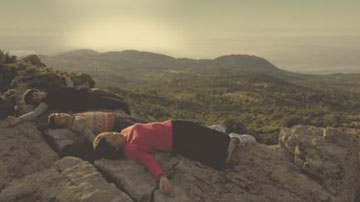Art creates, alters, and reinforces certain aspects of human nature. This fact destroys the notion of art as apolitical. Politics is a lame substitution for art.

Susan Sontag
I have several times applied to the work of art the metaphor of a mode of nourishment. To become involved with a work of art entails, to be sure, the experience of detaching oneself from the world. But the work of art itself is also a vibrant, magical, and exemplary object which returns us to the world in some way more open and enriched.

We are working now to dissolve human nature through art. To achieve an aesthetic experience that does not remove us from ourselves but annuls the self, allowing us to become empty and to merge seamlessly with everything else so that we are everything else.
Robert Musil:
And so, whatever the relationship may be between objects and feeling in the civilized person's mature view of the world, everyone surely knows those ecstatic moments in which a split has not yet occurred, as though water and land had not yet been divided and the waves of feeling still shared the same horizon as the hills and valleys that form the shape of things.

Andrei Tarkovsky:
The allotted function of art is not, as is often assumed, to put across ideas, to propagate thoughts, to serve as example. The aim of art is to prepare a person for death, to plough and harrow his soul, rendering it capable of turning to good.

The pinnacle of human nature is Nature.
[1] [2] [3]



1 comment:
On the first italicized quote: Introducing "politics" here seems uncomforable, as though it was shoved in there by someone who politicizes everything creating something of a false dichotomy, especially in light of the other quotes and the nature of art. A more appropriate direction would be to have said "This fact destroys the notion of art as non-religious" in the broadest sense of religion, but this doesn't really suffice either. These three aspects--politics art and religion--exist within an essential trinity that informs us about ourselves, the world, and our place in the world among others. There is a clear link between art and religion, something ecstatic that manifests itself comfortably one within the other-- art in religious contexts and the sublime qualities in art. And a further link exists between politics and religion, sometimes unfortunately, such that entwining right society with the divine is never far away from even the purest conceptions of a Republic. No such link exists, however, between politics and art. In fact, politics often seemsanathema to art--when the government acts a patron, it fails in the most ham-fisted ways to encourage good art; when the government tries to adopt art, the result is boring flags (in primary colors), bizarre anthems, and uninspiring monuments; and that which the government creates--compromise, policy, and war--the argument could be made that nothing is less like art.
I am trying to think of anything apart from those three broad categories that inspires us in such similar ways and to pursue such similar feats. Politics, art, and religion each bring us outside of ourselves (yet while bringing ourselves along) in consideration and action toward the greater human drama.
Perhaps all three inform each other as we aspire to godliness. Religion obviously ponders the nature of God, and politics exerts our collective power/dominion over each other and the earth. Perhaps art is the generative aspect of God within us (and conversely by which we create Him), and it is through this that we accomplish grace in both the aesthetic and theological sense.
Post a Comment